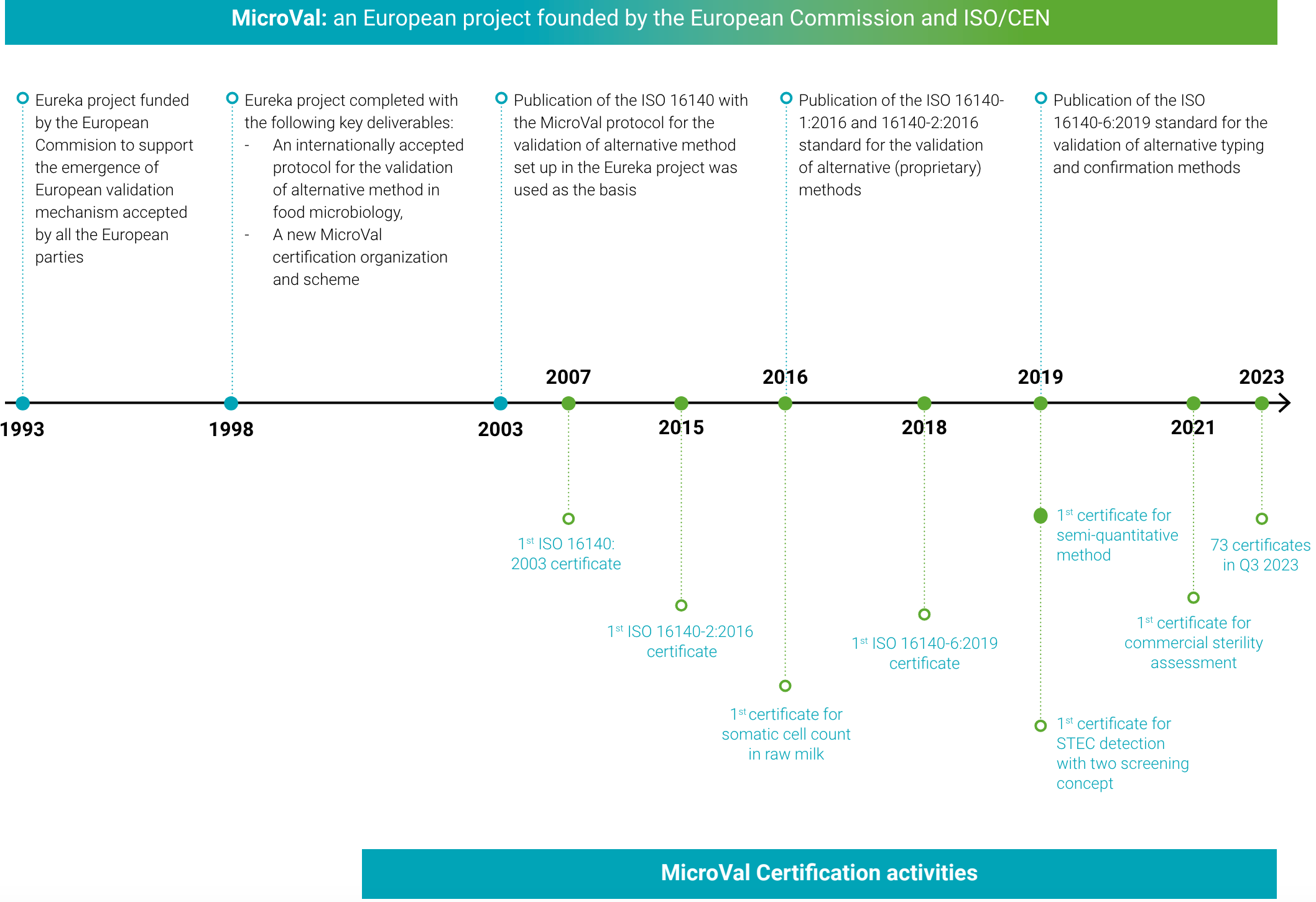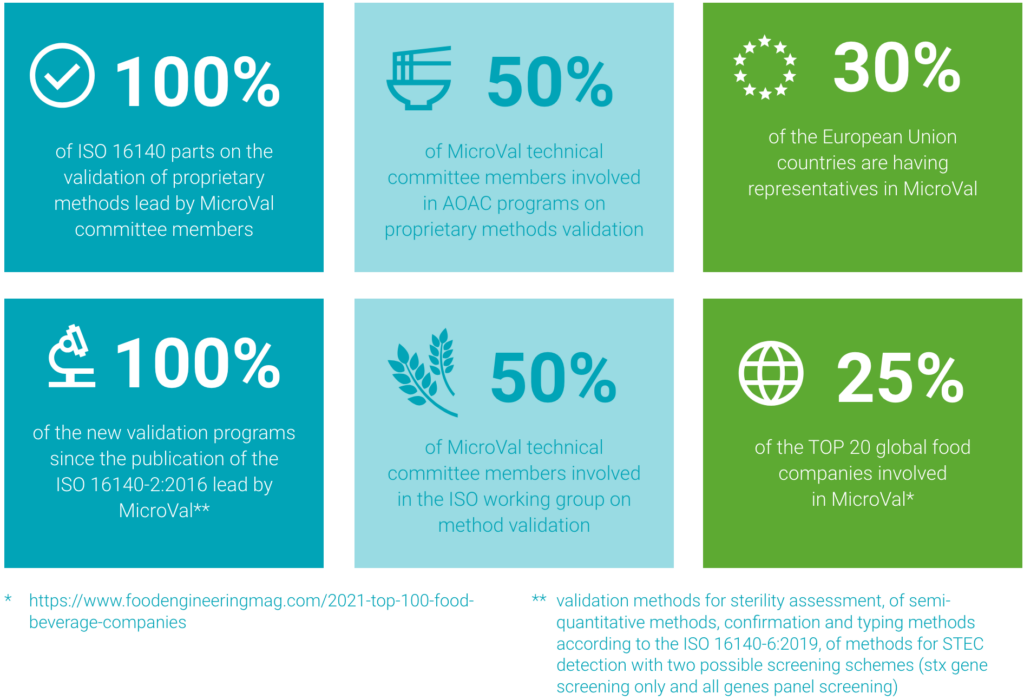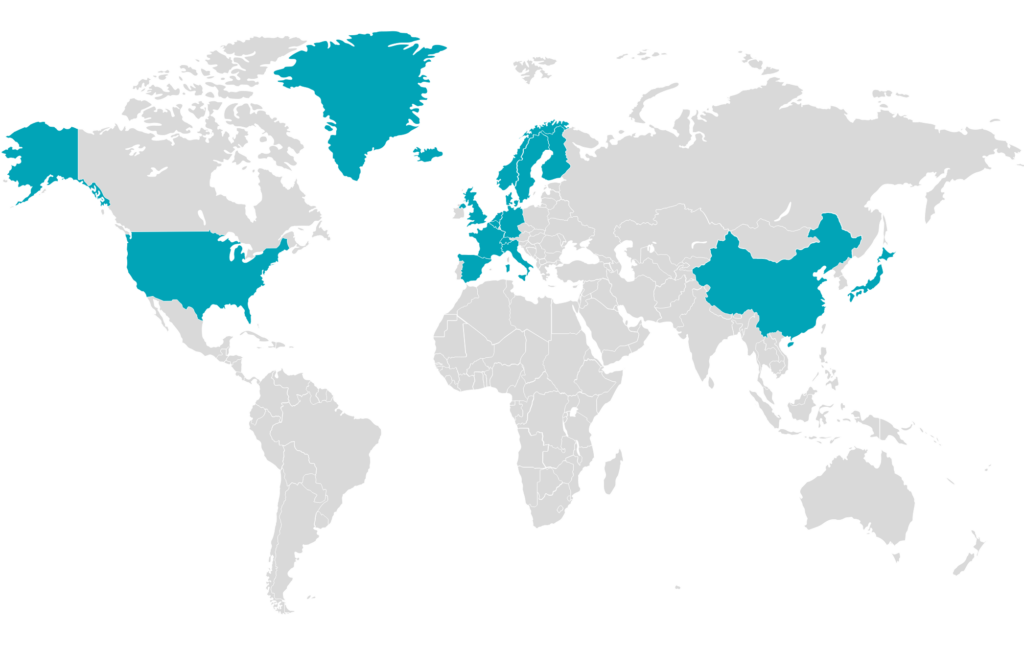Have you ever heard of MicroVal?
A progressive leader in the validation and certification of microbial methods for food and water
Read MoreMicroVal English
You may have heard of MicroVal if you are using alternative methods for microbiological analysis in your laboratory. MicroVal is one of three European based organizations that certifies alternative methods that have been validated against a reference method.
MicroVal started as the European Eureka project in 1993
- The Eureka project’s objective was to establish a European approach for the validation and approval of alternative methods for the microbiological analysis of food and drink (Rentenaar, 1994).
- This approach was developed by stakeholders from the food industry (such as Unilever and Nestlé), method developers, standardization organisations (from The Netherlands (NEN) and France (AFNOR)) and competent authorities.
- The project resulted in development of an internationally accepted protocol for the validation of alternative methods which was then used as the basis for drafting an internationally standardized protocol (EN-ISO standard) which was published in 2003 as: EN-ISO 16140 Microbiology of food and animal feeding stuffs – Protocol for the validation of alternative methods.
- With the publication of this ISO standard, the MicroVal organisation, as it is known today, was started.
The timeline of this activity, with milestones, is illustrated in Figure 1.

Why are these alternative methods so important?
Standardized methods, such as the EN-ISO standards, are based on testing methods that are freely available and therefore mainly rely on traditional culturing techniques that can be prepared in the laboratory by the user. However, many (proprietary) techniques/ methods exist today that often have advantages over the traditional methods such as: time-to-result, high throughput, and cost effectiveness. The question to be answered was: how can a user have confidence that these alternative methods work as well as traditional methods in practice? To address this question, the EN-ISO 16140 series was developed.
The importance of EN-ISO 16140 (2003) in Europe was already recognized by The European Union with its inclusion in the publication of the Commission Regulation 2073/2005 on Microbiological criteria for foodstuffs, which took effect in 2006. In this Regulation EN-ISO standards are regarded as the method against which the criteria must be tested. Countries exporting their foods to the European Union must also comply with this Regulation.
And within this Directive (updated in 2018) in Article 5, under Specific Rules for Sampling and Testing, it is stated:
Proprietary methods may be used as alternative analytical methods, provided they are:
- validated, in accordance with the protocol set out in standard EN ISO 16140-2, against the specific reference method provided for verifying compliance with the microbiological criteria laid down in Annex I, as provided for in the third subparagraph, and
- certified by an independent certification body.
MicroVal is an independent certification body
MicroVal is an independent certification body that validates alternative analytical methods against a reference method in accordance with EN-ISO 16140-2. It consists of several parts: the MicroVal General Committee (MGC), the MicroVal Technical Committee (MVTC), the certification body (LRQA), the seven expert laboratories performing the validation studies and a secretariat run by the Royal Netherlands Standardization Institute (NEN). Members of both the MGC and MVTC participate on a voluntary basis and are selected based on their experience and their passion for methods. MVTC members are selected for their technical expertise in method validation and make their decisions on method certification based on technical data and discussion, and not on commercial considerations. The MGC are selected based on their global experience, network and activities and is responsible for setting the MicroVal strategy. Currently MicroVal has certified more than 70 methods with a number of methods currently in the process of certification.
What makes MicroVal special, in addition to the fact that MicroVal is a non-profit organisation?
The key MicroVal figures presented in Figure 2 show that a percentage of members from both the MGC and MVTC are also experts in the ISO Working Group on the development of EN-ISO 16140 standards (as well as involvement in other ISO/CEN Working Groups). Moreover, the project leadership for the development of the EN-ISO 16140 standards is often fulfilled by experts who are also MicroVal members. This highlights the strong involvement and active participation of the MicroVal members in standardization projects related to food microbiology and method validation.
Although the MicroVal secretariat is based in the Netherlands, it is important to note, that MicroVal is an international organisation. Many countries from global regions are represented by the experts who sit on the MicroVal committees and in the list of expert aboratories. Global representation of countries in the MGC and MVTC is presented in Figure 3. The method developers who seek method certification through MicroVal, come mainly from North America, Europe and Asia.
MicroVal also works in close collaboration with AOAC INTERNATIONAL; many MicroVal committee members are involved in AOAC leadership and committees, and a number of validation studies have been conducted as joint MicroVal and an AOAC method validation studies, set up to meet the criteria of both organizations and receive recognitions from both organisations. A similar harmonization of validation studies has been conducted with NordVal International complying to both MicroVal and NordVal requirements to receive method certifications from both organisations.
Figure 2: MicroVal Key Figures


Figure 3: Countries represented in MicroVal.
MicroVal works proactively
Because of the excellent representation of MicroVal members in method validation and standards develop organisations, MicroVal is kept current with upcoming changes to standards. Here are a few examples to demonstrate this proactive work:
- MicroVal was able to validate and certify confirmation methods even before the corresponding EN-ISO 16140-6 was officially published. The first confirmation method certificates stated their validation was conducted against a “technically approved, but non-yet finalized” standard. These certificates were then updated once the final standard was published.
- MicroVal has validated methods based solely on the strict definition of Shiga-toxin producing E. coli (STEC) as given in ISO/TS 13136:2012 (E. coli containing an stx-gene), as well as validations in combination with other genes (for example adherence factors) or serotypes.
- MicroVal initiated a protocol for semi-quantitative method validation – a protocol which is currently not included in EN-ISO 16140-2: 2016 – to validate a qualitative alternative method against a quantitative reference method. This is intended to determine whether a certain (group of) micro-organisms is present below or above a certain concentration (e.g. <10 cfu/mL). With the success of this validation the protocol to validate these ltypes of methods is now being introduced into the amendment of the EN-ISO 16140-2 standard.
MicroVal continues to be a leading and proactive validation organization
MicroVal has demonstrated over the last 30 years that it is an international leader in its ability able to perform state of the art method validation studies. These studies comply with the relevant parts of the EN-ISO 16140 series for methods validation, which means these validated methods can then be used as alternative methods to meet the criteria for Sampling and Testing as listed in Commission Regulation 2073/2005.
The ability of MicroVal to have this forward thinking and proactive approach to methods validation is mainly possible due to the great and continued involvement of the globally represented MicroVal expert members who remain deeply entrenched in the work of international standardization of methods.
October 2023
Paul in ‘t Veld (NVWA/chair MVTC), Roy Betts (Campden BRI/former chair MGC), Adrianne Klijn (Nestlé/current chair MGC), Joost Witsenburg (MicroVal secretariat) and Hein Goeyens (MicroVal secretariat)